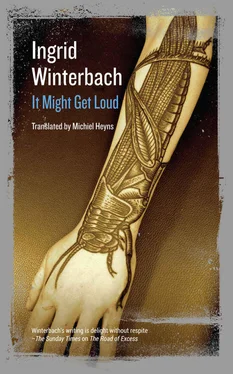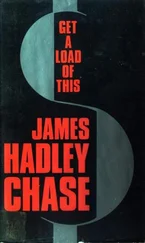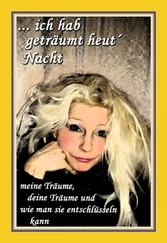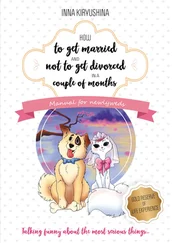On the eve of her operation Joy Park phones again. She doesn’t think she’ll be able to pay her rent for the next two months. She thinks the hospital is more than she’ll be able to cope with, but what can she do, she doesn’t have a choice. Her flat smells musty, Maria must please do something about it. She doesn’t know how she’s going to work after the operation, as it is she has so little energy. And people don’t have money for luxuries like massages any more; even some of her regulars are no longer coming. She’ll send out her CV as soon as she gets out of hospital, and she’ll put up adverts everywhere, but she doubts if she’ll find anything, because who wants to employ an older white woman nowadays? The friggin blacks are getting all the jobs. She’s sleeping badly and she’s lost a lot of weight. Her child is obstreperous, doesn’t want to know about her (Joy’s) problems. The psychic has seen two faces behind her again — this time her mother and grandmother’s, thank God not that friggin shitstirrer of a son-in-law’s again. What must she do with Maria’s post while she’s in hospital?
Maria thinks: Joy Park, pay your rent or don’t pay it. May God have mercy upon you in your hour of need. I’ll attend to everything once I’m back, but please don’t hassle me here again.
*
Maria keeps in email contact with Martin du Bois, her partner of the past few years, whom she so summarily dismissed. Also not exactly dismissed — he was in any case intending to open a new branch of the business in Taiwan. He keeps her informed on how the enterprise is going. She keeps him concisely up to date on her own life. They have a level-headed relationship, their dealings with each other are considerate, civilised. He’s been away from home before for shorter and longer periods, this is not the first time that they’ve been apart for such a long time.
Now Martin informs her ( now !) that he’s met someone, this relationship has burgeoned in the recent past, he’s considered it carefully, he feels this is what he wants to continue with. He is grateful for the years he and Maria have had together, but like himself, she no doubt can see that the limitations of their union exceed its benefits. (What a courteous man, so balanced, so little prone to over-reaction or excess, to hysterical allegation and irrational blame.) Yes, certainly, she sees it. Otherwise she would certainly not have dismissed him. Well — dismissed. But something of the kind. At any rate failed to ask him to stay, to reconsider his decision, to send someone else in his stead. No, she can’t blame him for seeking solace in someone else’s arms. (Are she and the economist not at this time engaged in the ecstatic celebration of vital forces?) Go by all means, she said to him. (Bottom line: seek solace where you can find it; that much I can no longer offer you.)
His decision nevertheless comes as a shock. It’s never a good idea to start a relationship on the rebound, as she did with Martin. She didn’t realise it then, but she now recognises that she was at the time still fatally attracted to that damn charmer and charismatic high-flyer, her ex-husband, the sculptor Andreas Volschenk. She left him , admittedly, but not without its breaking her heart. It was not easy to give him up — she always found him physically so alluring, such a life-affirming, ravishing lover. (The first time he laid her down in his studio, unloosed his hair, leant over her, and had her half-delirious with delight.) Because she found him so irresistible, she put up with much more than she should have. Was much too accommodating for much too long.
Him the therapist didn’t even get round to; Maria took to her heels too soon. Took flight, her ears stopped with both hands. Hardly had the woman mentioned the mother, mentioned the father, the sister’s name still hovering in the atmosphere around them, when Maria clammed shut and said: Thank you, this I cannot deal with right now.
Mother, father, sister. In particular, sister. Nothing to be done about it. Is she being silly? Maria wonders. Is she feverish? Is she sickening for something? Good Lord, Sofie, she thinks, what possessed you?
HE’S NOT THE NATURE-LOVING TYPE. Karl burns rubber through the Karoo. He feels as if he’s hurtling down a river in a barrel heading for a fucking waterfall. No control over his destiny. He feels as if he’s barrelling headlong towards his doom.
In the road there are black worms. He doesn’t know what kind of worms they are or where they’re coming from or where they’re going to. Every so often one or two of them cross the road. They all seem quite confident of their destination — where possible he tries not to drive over them.
He sees two dead tortoises next to the road, and one dead jackal.
In the late afternoon a dirty big cloudbank masses ominously in the west ahead of him. Zilch compared with the dark cloud in his head.
*
The closer he gets to Cape Town, the more he wants to turn back. The less prepared he feels; the less up to the job. He should never have tackled the trip on his own. What was he thinking? He should have brought Hendrik. (They could have stopped over at the Gariep Dam.) Mistake. Error of judgement from beginning to end. His mother used to say: You have only yourself to blame; what goes around, comes around.
Why is the landscape so desolate? The towns, the places people live in! Hemmed in by barren hills. How do they stand it? If he’d lived here, he’d have topped himself long ago. His mother could be pretty unbending, with her maxims and mottos. Like a woman from his Children’s Bible — Rachel or Naomi or Ruth, or someone. She didn’t have an easy life, because her husband died young. He and Iggy were still small — Iggy was eleven, he was nine. She saw many things, his mother, because she wasn’t scared of looking. Jesus — with a mother like that! She loved them, him and Iggy, though she never really showed it, not the affectionate type. But she had a soft spot for Iggy, that’s the only time Karl can remember her having a softness in her glance — when she looked at Iggy. At the stuff he made — the saucer with the germinating bean, the volcano from papier mâché, the bats, the clay stuff.
That he should be thinking of her today. Probably because things are in such a bloody mess. Just as well she’s dead — she’d have had a hard time coping with Iggy’s troubles.
In Laingsburg he stops to have something to eat, in a presentable, quite companionable little place, a kind of home industry and coffee shop, The Red Tea-Cosy, with a vast collection of enamel jugs and containers displayed in a large cabinet, and knitted stuff and cakes and cookies and jams (probably the handiwork of locals wanting to earn an extra pittance). Knitted tea-cosies in pretty colours. He’d have bought Juliana one if they’d still been together. But Laingsburg looks like a very depressing place to him. The Lord knows, he could never live here. If he’d been living here when the floodwaters came, he’d have let himself be washed away, he wouldn’t even have offered resistance.
He suddenly thinks of a lyric of the band Corrosion of Conformity. It just comes to mind: ‘Lying in the sun with a loaded gun.’ Probably because he’s feeling so shit, with a feeling of impending doom, like a gun that can go off at any moment. An intense band, although not as aggressive as the crazy Swedish guys who run around burning churches.
His cell phone rings. He assumes it will be Josias Brandt again, but it turns out to be the Joachim-guy with the beetroot claw.
‘I was expecting a call from you,’ says the man.
‘I am concerned about Ignatius,’ says Karl.
‘Rightly so,’ says Joachim, ‘rightly so. I don’t want to cause you unnecessary disquiet, but Ignatius is embroiled in a bitter conflict, do you understand? Whether he will survive it, we don’t know.’ (For sure, Karl thinks, that point you’ve made by now.)
Читать дальше












